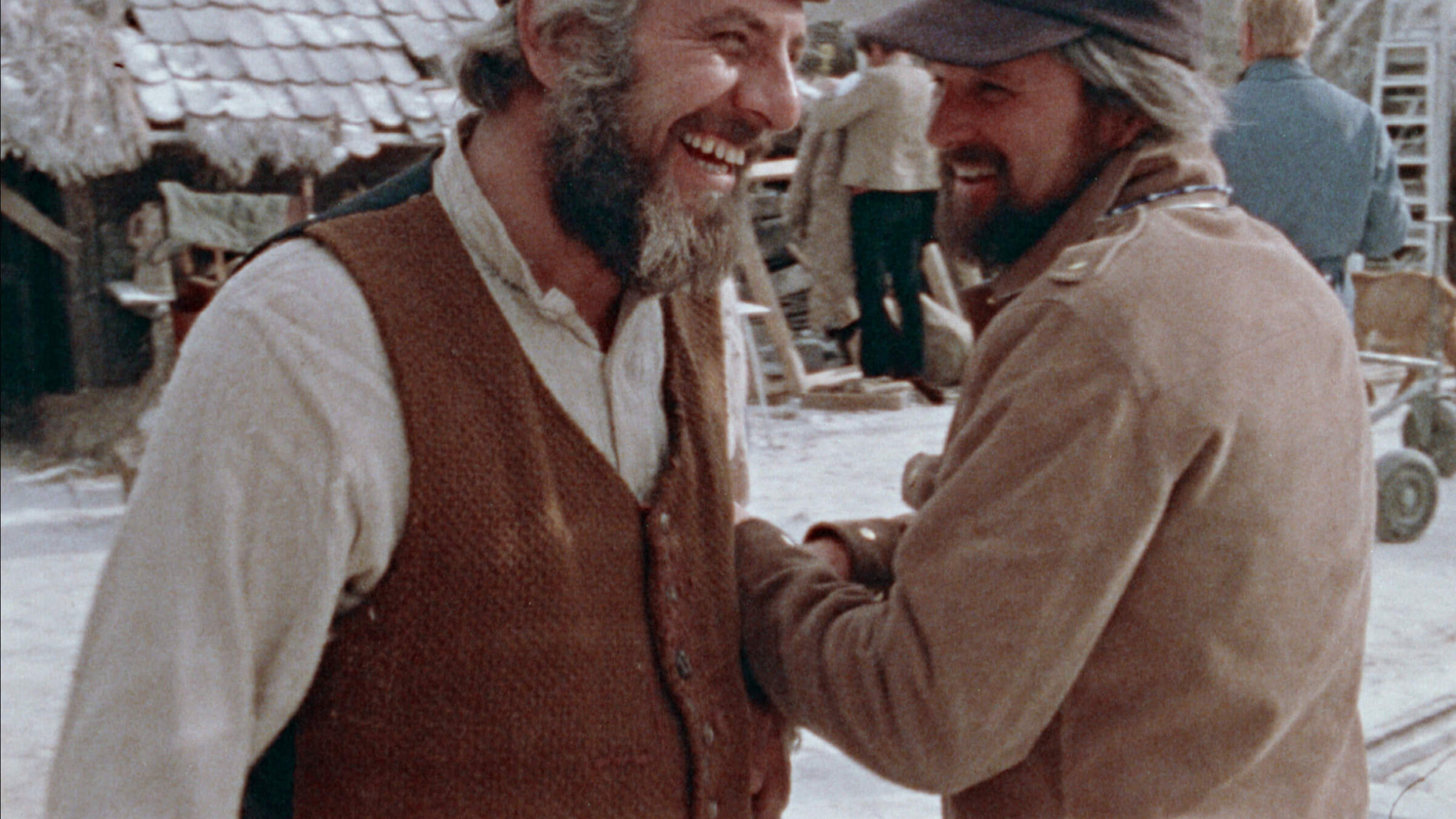Remembering Topol, the people’s Tevye
Chaim Topol, who starred in the film adaptation of Fiddler on the Roof, died Thursday at 87

Topol and Norman Jewison on the set of the 1971 movie musical ‘Fiddler on the Roof.’ Photo by Zeitgeist Films
Fiddler on the Roof is a landmark piece of Jewish culture. It has shaped the way Jews are perceived by others, and how we understand ourselves, since it premiered on Broadway in 1964, starring Zero Mostel as the iconic milkman Tevye.
The thing is, not everyone can go to a Broadway show. So for everyone else, there was Topol.
I’ve often heard that Mostel’s performance was incredible. A titan of the Yiddish theater scene, he defined the role, and reportedly pushed the writers and directors for greater authenticity through the musical’s development. But for me, and millions of others, Topol’s version of Tevye in the 1971 movie adaptation of Fiddler is the one that truly defines the musical.
His Tevye is larger-than-life: twinkling and wry in the opening number, “Tradition,” and balancing the schtick and camp of songs like “If I Were a Rich Man” with real emotion when the film takes on the heavy issues of pogroms, persecution and family ruptures.
The role turned the actor, who died at age 87 on Thursday in Tel Aviv, into “Israel’s most famous export since the Jaffa orange,” according to The Jerusalem Post. The Associated Press estimated that the movie has been viewed by over a billion people.
Chaim Topol, who used his last name as a mononym for most of his professional career, first played Tevye in a Hebrew-language Tel Aviv stage production, and then one in London. For the latter, he said, he had to phonetically memorize the songs, because at the time he knew “about 50 words of English.”
Yet the film’s director, Norman Jewison — who is, ironically, not Jewish — cast Topol over Mostel in the film version of Fiddler. As he explained in the 2021 documentary Miracle of Miracles, on the making of the movie, he worried Mostel’s Yiddish theater schtick would subsume the role, making it too difficult for viewers to connect with the story.
Jewison wanted a Tevye who would make the story hit hard for the widest variety of audiences. And that’s what he got.
The film made Topol into a global Tevye: He would go on to reprise his role in stage productions across the world, including in Turkey, Greece and Japan. Residents of each country, he said, in a 2017 interview with Mishpacha, connected to the story in their own ways.
“Everywhere I performed, I was able to sense that the audience identified with my characters,” Topol said. “There’s this scene in Fiddler where the Cossacks storm onstage and conduct a pogrom. When I took a look at the audience, I could tell that they identified personally with the scene. When I performed in Turkey, the audience saw their Armenian enemies in those Cossacks. And when I performed in Greece, the audience was visualizing their Turkish oppressors. I guess every nation has its own personal Haman.”
Topol saw firsthand how universally resonant Fiddler’s themes were: the struggle between tradition and modernity, the importance of family. But he also embodied it as a deeply Jewish story.
When I flew to Utah last year to cover a production of Fiddler at Brigham Young University, the flagship college for the Church of Jesus Christ of the Latter-day Saints, most of the cast told me they had watched the movie to try to better understand Jews, a group many of them had little knowledge of or contact with. Topol’s Tevye shaped how they understood what it meant to be Jewish. His accent and mannerisms defined Jewish culture; his impromptu, heartfelt conversations with God and his steadfast and sometimes humorous confrontation of shtetl life’s miseries shaped their grasp of Jewish history, values and the very concept of God.
Fiddler was carefully structured to make Judaism and the influx of Jewish immigrants after the Holocaust sympathetic and accessible to outsiders. But as American Jews have become increasingly assimilated into American culture, it has turned into a touchstone for the Old World roots that help ground Judaism as a unique ethnicity and culture.
“I never attended Hebrew school but, thanks to Fiddler on the Roof, I learned what the Sabbath is and the rules related to its observance,” Emily Knoppert wrote in Kveller in 2020. “I know that if I listen to the Fiddler soundtrack, I feel like I am part of something tangible in the world, something bigger than my own questioning sense of identity.”
For so many people, Jews and non-Jews alike, Topol remains the face of Fiddler — and the face of Judaism. As Tevye sings: “How do we keep our balance? That I can tell you in one word: tradition.” Now, Topol himself has become the tradition.
A message from our Publisher & CEO Rachel Fishman Feddersen

I hope you appreciated this article. Before you go, I’d like to ask you to please support the Forward’s award-winning, nonprofit journalism so that we can be prepared for whatever news 2025 brings.
At a time when other newsrooms are closing or cutting back, the Forward has removed its paywall and invested additional resources to report on the ground from Israel and around the U.S. on the impact of the war, rising antisemitism and polarized discourse.
Readers like you make it all possible. Support our work by becoming a Forward Member and connect with our journalism and your community.
— Rachel Fishman Feddersen, Publisher and CEO






























